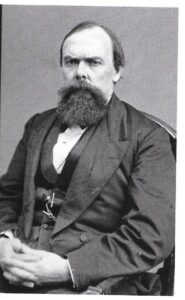Local historians say it’s time to eat free cake and celebrate the 200th birthday of a Hoosier credited with helping save the Union during the Civil War.
Wayne County Tourism is organizing a celebration at 1 p.m. Saturday, Sept. 9, at Centerville United Methodist Church to recognize the life and contributions of Oliver Perry Morton.
The church, at 112 S. Morton Ave., also is celebrating its 200th year.

Guests can enjoy music by Richmond Symphony Orchestra musicians, a plaque dedication and walking tour of places Morton attended in town and where he was married, a Boy Scouts flag presentation, and a performance of “The Star-Spangled Banner” by Cindy Slick.
Centerville’s town council and Wayne County commissioners also will provide proclamations. Sept. 9 will be known as Oliver P. Morton Day throughout the county.
Author James Fuller from Indianapolis will share insights he gathered about Morton while writing a 2017 biography, “Oliver P. Morton and the Politics of the Civil War and Reconstruction,” which was published by Kent State University Press.
And, Wayne County’s retired historian, Carolyn Lafever, will discuss her insights into the Morton family. She wrote a biography about Lucinda Morton that’s soon to be released.
Lafever shared articles noting that during a 1923 celebration for Morton’s 100th birthday, Centerville renamed Main-Cross Street to Morton Avenue and unveiled a monument on the site of the old Morton homestead, and a parade featured Civil War veterans. That gathering drew national and state leaders, including two senators, the governor and postmaster general as speakers.
About Oliver P. Morton
Personal: Oliver Perry Morton was born in Salisbury (now Centerville) on Aug. 4, 1823. (His parents were James and Sarah Throckmorton, but the family later dropped the “throck”). He was orphaned at an early age and raised by grandparents and aunts. He married his wife Lucinda, who also grew up in Centerville, in 1843. They had three sons, along with two daughters who died as infants. Morton died at age 54 on Nov. 1, 1877, in Indianapolis, where he’s buried at Crown Hill Cemetery.
Education: Morton attended school in Wayne County Seminary in Centerville. After apprenticing for four years as a hatter, he attended Miami University in Oxford, Ohio, where he distinguished himself as an excellent debater. He didn’t graduate, but knew he wanted to become a lawyer, and began studying law with Centerville lawyer John Newman in 1843. Newman later said Morton “possessed a keen insight into human nature” and “was industrious and exhibited a quickness of comprehension and a vision that could not be denied.” Morton was admitted to the bar in 1847 and practiced law until he became governor.
Politics: Morton was a Democrat as a young man but disliked the influence of Southern states in that party. In 1856, Wayne County selected him to attend the first convention of the new Republican Party in Pittsburgh.
Statues: Morton is one of Indiana’s two statues in the U.S. Capitol’s Statuary Hall in Washington, D.C., and a replica of that statue is on the second floor of the Wayne County Courthouse. (Lew Wallace is the other Hoosier recognized there). In addition, a bronze statue of Morton flanked by two Union soldiers stands on the steps of the Indiana Statehouse in Indianapolis and faces east toward Monument Circle.
Sources: Carolyn Lafever, mrlinfo.org/history/biography and secure.in.gov/history.
About Morton’s career
Morton was best known as governor of Indiana during the Civil War.
In 1856, Republicans nominated Morton as their governor, but he was defeated. However, in 1860, Morton was elected lieutenant governor, and took on the top job soon after, according to Morrisson-Reeves Library.
When Gov. Henry S. Lane left to serve as a U.S. senator, Morton became governor from Jan. 18, 1861, to March 4, 1867. He was the first Indiana-born man to become governor.
Immediately after President Abraham Lincoln called for troops, Morton pledged and raised 6,000 men, never failing to meet subsequent calls.
At one point the legislature had failed to provide for bonuses and advance pay for newly inducted troops, putting the war effort at risk.
Morton personally raised $500,000 in a matter of days, $100,000 of that coming from Richmond native Mark E. Reeves, then a merchant in Cincinnati.
Throughout the war, Morton was known as “The Soldiers’ Friend” for his material support of Indiana’s troops, and he remained one of the strongest supporters of the federal government.
During a celebration of Morton’s 100th birthday, Sen. James Watson said that Morton’s aid in the passage of the 14th and 15th Amendments “is sufficient to instate him in our estimation as among the greatest of all Americans. Aside from Abraham Lincoln, he was the greatest product of the United States during the Civil War.”
Soon after being reelected governor in 1864, Morton had a stroke that paralyzed his legs, but he stayed active in office. He served as U.S. Senator from Indiana from 1867 until his death in 1877.
A version of this article appeared in the September 6 2023 print edition of the Western Wayne News.
